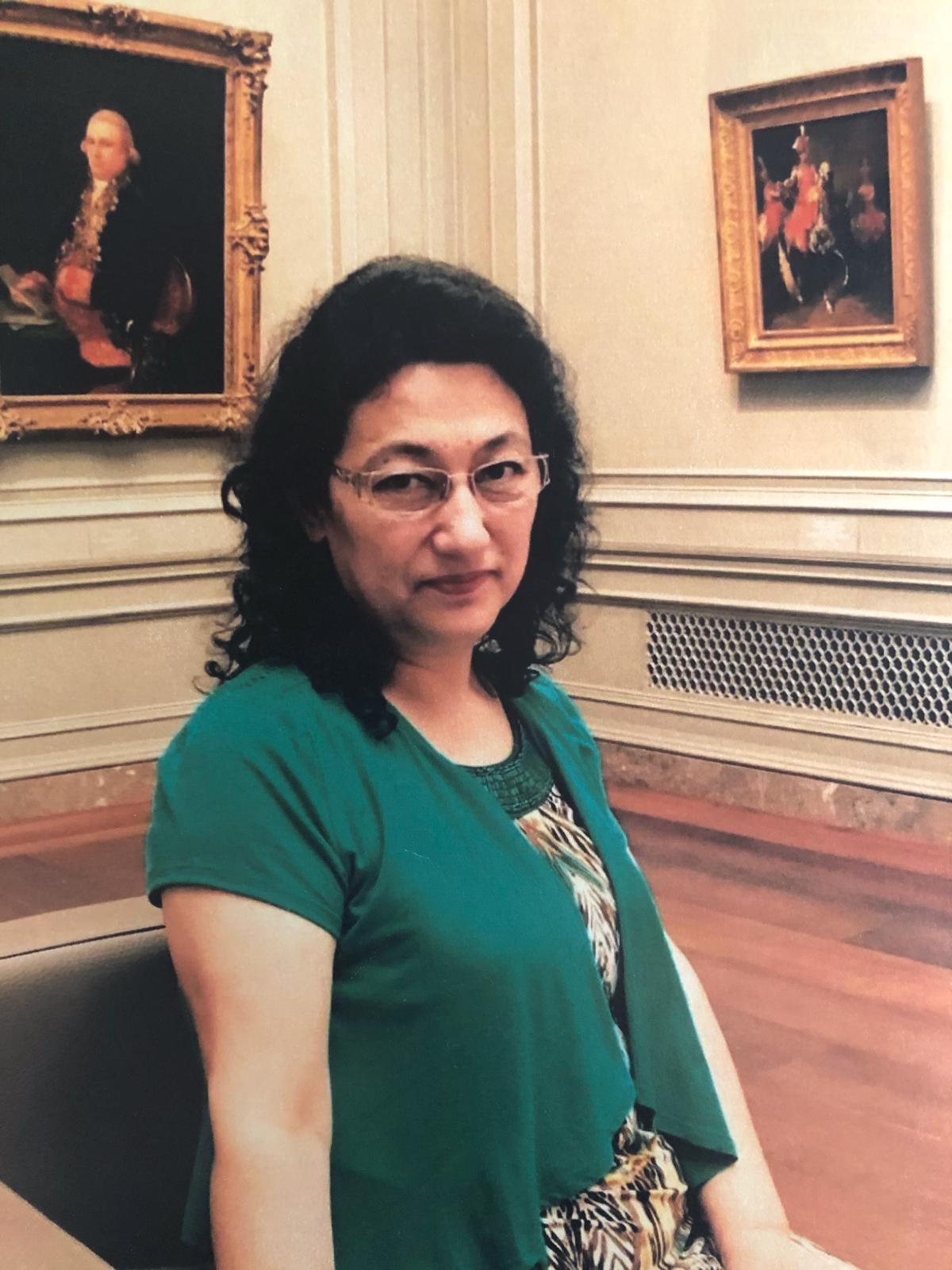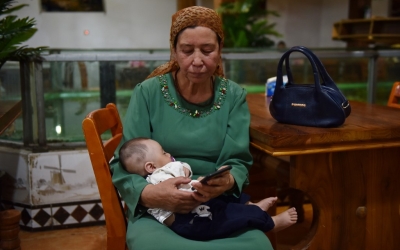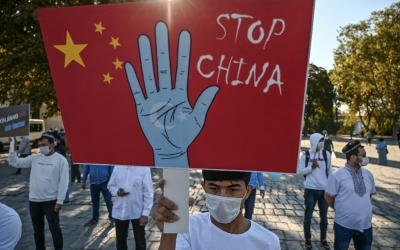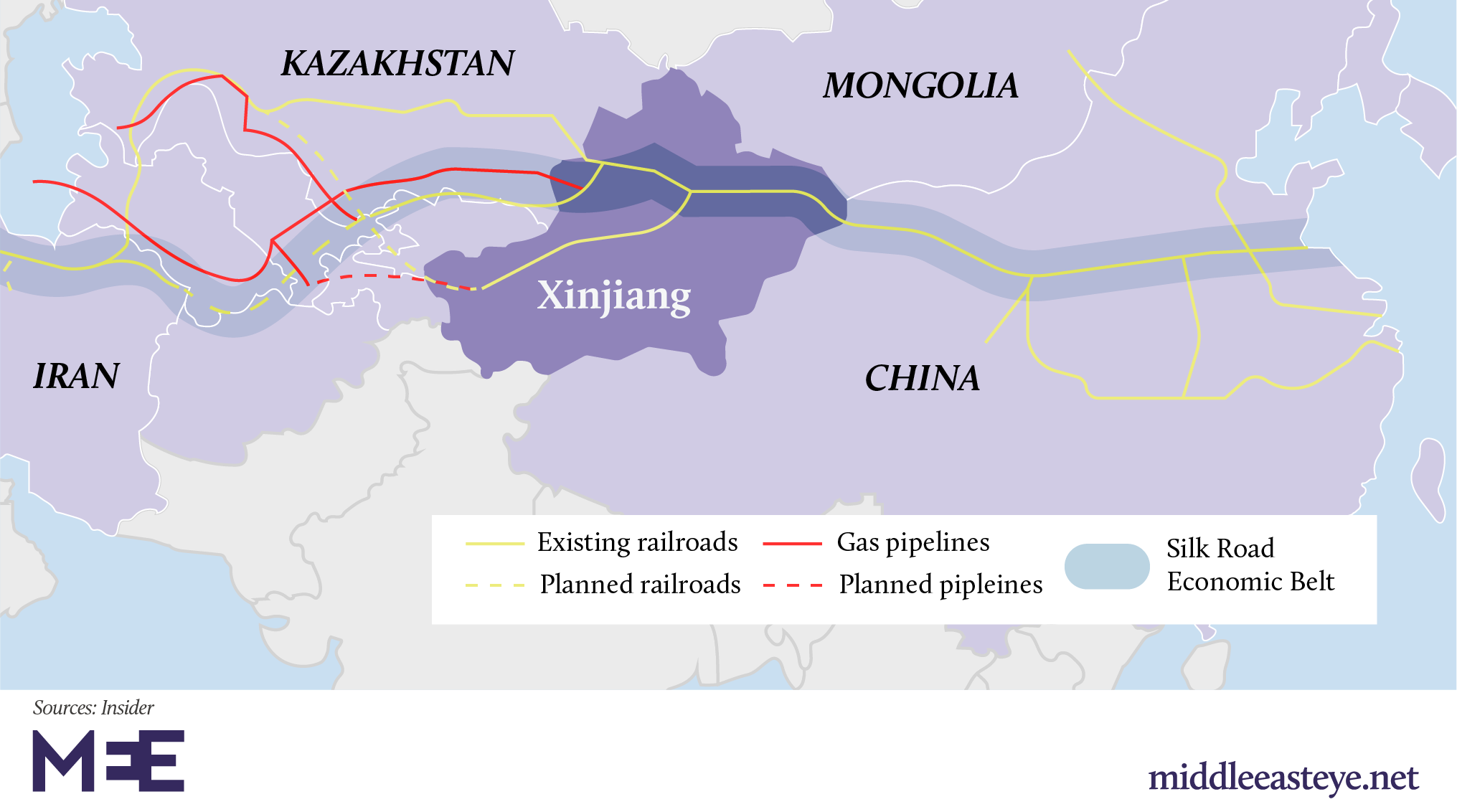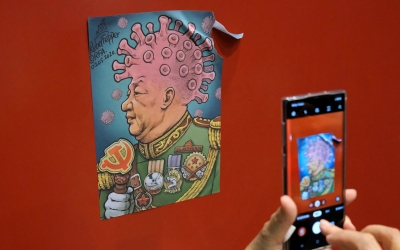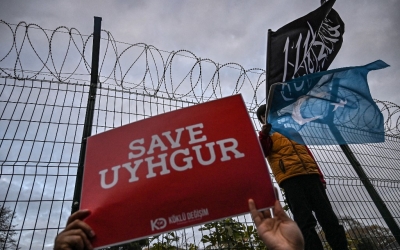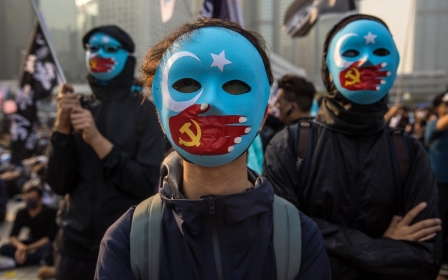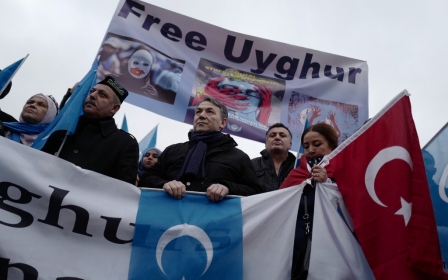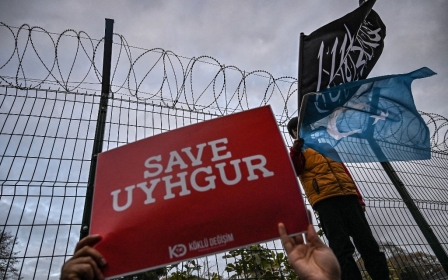
Uighur activists: Stuck between Chinese persecution and US imperialism
In September 2018, 58-year-old Gulshan Abbas disappeared from the town of Urumchi in China's northwestern region of Xinjiang.
Her sister, Rushan Abbas, the founder and executive director of the Campaign for Uyghurs, has claimed that Chinese authorities detained her in retaliation for her activism.
"It was only in mid-2020 that we learned from a third-party source that she had been taken to prison," Abbas told Middle East Eye.
'The Chinese regime is functioning as an international criminal organisation and taking innocent people hostage'
- Abbas, Uighur activist
Six days before her sister's disappearance, Rushan had appeared on a panel at the Hudson Institute, where she revealed how her husband's entire family had vanished into camps.
"This is very common [occurrence] among Uighurs [and their families] and was a clear retaliation for my use of free speech as an American citizen," she said.
New MEE newsletter: Jerusalem Dispatch
Sign up to get the latest insights and analysis on Israel-Palestine, alongside Turkey Unpacked and other MEE newsletters
For decades, China has sought to portray harsh security measures in the region as being part of Beijing's battle against "terrorism".
The government has launched a sweeping crackdown on the Muslim population, including mass surveillance, detention, indoctrination and forced sterilisation.
Stories of mass disappearances, executions and the destruction of mosques and cultural sites have become a staple.
China has even gone as far as to compare adherence to Islamic religiosity as a form of ideological illness, requiring treatment in a "re-education hospital".
"The state has operationalised 'Islam' as a signifier of potential state disruption and treated Muslims with force, dominance and discipline," Kristian Petersen, whose research focuses on the development of Islam in China, recently wrote.
This has involved banning beards for men and face veils for women or reportedly forcing Muslims to eat pork or drink alcohol.
According to testimony uncovered by the BBC, Uighur inmates have recalled incidents of systematic rape, sexual abuse and torture in internment camps said to house more than a million people; claims the Chinese have repeatedly dismissed as "lies and absurd allegations".
Despite the denials, China itself is finding it increasingly difficult to explain wholesale changes in the region.
Earlier this month, a Xinjiang Development Research Center study attempted to explain the decrease in population growth from 11.4 per 1,000 people in 2017 to 6.13 per 1,000 people in 2018.
It attributed the decrease to "the implementation of a unified family planning policy, changed mindset on marriage and procreation and reined-in religious extremism in the region".
This study came on the heels of a since-deleted tweet from the Chinese embassy in Washington DC, in which it all but admitted to forced sterilisation of Xinjiang women.
Still, there is no international consensus on how the crisis may be tackled. Neither Muslim-majority countries in the Middle East, Africa or Asia have come forward to assist the marginalised community.
Experts say their cause exposes another faultline in the international community's resolve to end state-led ethnic cleansing or war crimes.
Instead, the inaction has led Uighur activists such as Abbas to seek out a promise of American justice, despite the United States' own long history of Islamophobia, state-led surveillance and incarceration of Muslims.
"I feel squeezed," said Abbas. "The US began to wake up to realities that they ignored for decades during the Trump administration, but the action is late.
"The Chinese regime is functioning as an international criminal organisation and taking innocent people hostage."
'A genocide'
In one of the Trump administration's final set of actions in January 2021, the US ruled that Chinese actions in Xinjiang amounted to genocide.
"I believe this genocide is ongoing, and that we are witnessing the systematic attempt to destroy Uighurs by the Chinese party-state," Secretary of State Mike Pompeo said on his last day in office.
The Chinese government immediately dismissed the remarks as "outrageous lies".
Other countries often close to Washington on foreign policy issues have not followed the US move.
Boris Johnson, the British prime minister, described China's treatment of the Uighurs as "utterly abhorrent" but said that a genocide designation was a "judicial matter".
Responding to opposition calls to use the term "genocide", Justin Trudeau, the Canadian prime minister, said on Tuesday it was something his government was looking at, but cautioned that such a move needed to be "clearly and properly justified".
"That’s why it is a word that is extremely loaded and is certainly something that we should be looking at in the case of the Uighurs,” he said.
“We will continue to work with the international community and move forward on making the right determinations based on facts and evidence as appropriate."
But the move was already one of several actions taken by the US government. A week earlier, Congress had banned cotton and tomato imports from Xinjiang, worth $9bn and $10m in 2020 respectively, amid multiple allegations they were being produced by forced labour.
Earlier, in September 2020, US lawmakers passed the Uyghur Forced Labor Prevention Act, which seeks to ban products made in Xinjiang on account of forced labour, imposes specific sanctions on foreign individuals who engage in forced labour and forces companies to disclose information related to Xinjiang.
The bill is still to be ratified in the Senate.
But even as the US has led the charge against China, not all Americans have come on board.
According to the Centre for Strategic and International Studies (CSIS), the US was the fastest-growing export market for the Uighur region, increasing by more than 250 percent between April 2019 and April 2020.
Late last year, the New York Times reported that American giants such as Apple, Nike and Coca-Cola had all spent large amounts of money lobbying against the Uyghur Forced Labor Prevention Act.
Apple told the newspaper its lobbying efforts were aimed at strengthening the act. Coca-Cola said it "strictly prohibits any type of forced labour in our supply chain". Nike denied lobbying against the bill but said it had "constructive discussions" aimed at eliminating forced labour.
Who are the Uighurs?
+ Show - HideThe Uighurs are a nomadic Turkic people native to Xinjiang in western China, which the Uighurs prefer to call East Turkestan and which lies on the ancient Silk Road. The mostly Muslim minority make up around 12 million people in the region.
According to multiple reports, more than one million Uighurs are currently being held in internment camps across Xinjiang.
Human Rights Watch said in September 2018 that up to 13 million Muslims in Xinjiang have been subjected to “forced political indoctrination, collective punishment, restrictions on movement and communications, heightened religious restrictions, and mass surveillance”.
Uighur activists say that entire families have disappeared into the camps or been executed in what they describe as a “genocide”.
China has repeatedly denied allegations that it is persecuting the minority group, instead describing the camps as “vocational training centres” designed to counter religious extremism.
In January, the US State Department accused China of genocide in one of the Trump administration’s final acts. Other countries have condemned China but have stopped short of designating its actions as genocide.
The United Nations defines genocide as acts “committed with intent to destroy, in whole or in part, a national, ethnical, racial or religious group” including: (a) Killing members of the group; (b) Causing serious bodily or mental harm to members of the group; (c) Deliberately inflicting on the group conditions of life calculated to bring about its physical destruction in whole or in part; (d) Imposing measures intended to prevent births within the group; and (e) Forcibly transferring children of the group to another group.
"This is complicity in genocide," Abbas says categorically, adding: "The US is also highly implicated in the genocide, but we have the democratic freedoms to allow dissenters and activists to demand action on these issues."
Although Trump's parting shot at China was welcomed by human rights activists as well as Uighurs themselves, they arrived during the frenetic last days of the Trump presidency, which were marked by allegations of the former president having encouraged an insurrection at his own government buildings, a refusal to accept election results and having the unenviable reputation of becoming the first head of state to be banned on social media for hate speech.
From the start of his presidency, Trump pushed an "America first" agenda in both domestic and foreign policy, leaving no doubt that any pressure against China was driven by a determination to sideline the country's biggest rival since the end of the Cold War.
On other matters of foreign policy, Trump presided over the controversial decision to move the US embassy in Israel to Jerusalem and facilitated a series of normalisation deals between Israel and Arab countries, which included coercing the likes of Sudan into recognising Israel in exchange for losing its terror designation.
The Trump administration recognised Morocco's sovereignty over disputed Western Sahara, blocked attempts to stop sales to Saudi Arabia over its role in devastating Yemen, and defended Saudi Crown Prince Mohammed Bin Salman even after the horrific murder of journalist Jamal Khashoggi.
"It is true that there were problems with Trump's ideologies but then it is also true that his support for the Uighur cause helped us highlight the Chinese atrocities on Uighurs," Gulnaz Uighur, an activist now based in Europe, told MEE.
"Personally, when I compare the US response with the silence from Islamic nations, then I am not in a dilemma any more … millions of us are struggling," she said.
US, China and the 'war on terror'
In 2013, Chinese President Xi Jinping launched a mammoth infrastructure project that would stretch from East Asia to Europe. According to CSIS, China is said to have invested between $1tn and $8tn into the Belt and Road Initiative (BRI) project.
Experts agree that the BRI, which would run through Xinjiang, was among the major reasons China sought to "homogenise" the region by clearing out, or "pacifying", the Uighurs.
The BRI is also among the major reasons for the silence among so many Arab, Central Asian and South Asian countries.
"There are some countries which are in a position of reliance on China, and others whose authoritarian systems make them look to China as a model," Omer Kanat, executive director of the Uighur Human Rights Project (UHRP) in Washington, told MEE.
"There is a disconnect between governments and citizens in many countries, where China's strategy of elite capture determines a pro-China policy," Kanat said.
China's economic dominance has seen even Turkish President Recep Tayyip Erdogan's support for the Uighurs (he called the deaths of Uighurs killed during unrest in Xinjiang in 2009 a "genocide" at the time) perform a 180 degree turn since his economic woes began post-2016. After Russia, China is Turkey's biggest import partner.
Abbas argues that while she "understands" it would be hard for leaders of countries economically indebted to China to speak out, their silence is "still disappointing".
"Where are the voices of the Muslim-majority countries to defend their Uighur Muslim brothers and sisters? China is waging a war on Islam and the Uighur cause should be treated as part of the cause of Islam."
But the long-standing vilification of China by the US has also made many countries troubled by US imperialism, which has characterised US political and military intervention since the Second World War, wary of jumping aboard America's condemnations against China.
In a statement to the UN last October, 39 mostly western countries called on China to "respect human rights, particularly the rights of persons belonging to religious and ethnic minorities, especially in Xinjiang and Tibet".
In response, 45 countries, led by Cuba, signed a statement describing China's actions as a response to "the threats of terrorism and extremism in accordance with the law to safeguard the human rights of all ethnic groups in Xinjiang".
Among those countries defending China were Saudi Arabia, Bahrain, Egypt, the UAE, Morocco, Iran, Iraq and the Palestinian Authority.
Countries who previously defended China but opted out of the 2020 statement included Nigeria, Oman, Algeria, the Philippines, Qatar and Somalia.
The Uighur issue has made strange bedfellows with autocratic regimes, as countries with purportedly leftist and anti-imperial agendas and nascent democracies have sided with China.
"This really speaks to the collapse of the left outside the bounds of the nation-state. It is as if the left has also been captured by the language of the state. It is as if responding to these crises would be interpreted as aiding (American) imperialism," Vincent Wong, a PhD candidate at Osgoode Hall Law School in Toronto and a human rights activist, told MEE.
Deepa Kumar, professor of media studies at Rutgers University in New Jersey, agreed, arguing that some support for China's policies showed that "there was a section of the left that sees the enemy of my enemy as my friend".
"This is a really problematic logic because it puts them in a situation where they wind up supporting dictatorial regimes and turning a blind eye to atrocities like the genocide and mass rape that is currently taking place in Xinjiang," Kumar told MEE.
US-China competition
In a press briefing in early February, Ned Price, an incoming State Department spokesperson, said the US would engage with China on certain matters, clarified that America was in "serious competition with China", and that the Biden administration was "positioning ourselves to compete and ultimately to outcompete with the Chinese through our own sources of strength".
"Strategic competition is the frame through which we see that relationship," Price said.
"We know that China is engaged in a range of conduct that hurts American workers, it blunts our technological edge, it threatens our alliances and influence in international organisations, and China is engaged in gross human rights violations that shock the conscience.
'The Chinese government's interest in resource extraction in the province from natural gas to cotton as well as labour exploitation has led to a system of repressive control against those who organised against Chinese interests'
- Vincent Wong, human rights activist
"So we will counter China's aggressive and coercive actions, sustain our key military advantages, defend democratic values, invest in advanced technologies and restore our vital security partnerships," Price added.
A spokesperson for the State Department told MEE that the atrocities committed by the Chinese amounted to crimes against humanity and "shock the conscience and must be met with serious consequences".
But the spokesperson could not furnish any details as to what those consequences might amount to.
Observers such as Kumar, author of Islamophobia and the Politics of Empire: 20 Years Since 9/11, said the suffering of the Uighurs had become "a convenient excuse to create anti-China sentiment in the US".
"China was listed as an emerging threat to US global hegemony by neoconservatives all the way back in the early 1990s," Kumar said.
"The logic, which is now bipartisan, is that the US must act preemptively to prevent the rise of a rival on the global stage to its hegemony."
The State Department did not respond to MEE's request for comment over criticism it was using the Uighur issue to undermine an economic rival.
Others, like Wong, said it was the US that helped China use the spectre of terrorism to impose its will over Xinjiang for economic reasons, effectively making the turnaround even more absurd.
"In the 90s there was a lot of [Chinese] interest in Xinjiang, because of the oil and gas, its cotton industry and tomatoes. There was a lot of interest in economically exploiting it," Wong told MEE.
"Following September 11, the Chinese were able to turn the conversation into a question of securitisation and terrorism."
So much so, that the US and China cooperated in promoting what a Human Rights Watch counterterrorism expert has called "an abusive counterterrorism architecture at the United Nations" following the events of September 11, culminating in 22 Uighurs being held for years without charge at Guantanamo Bay.
By 2014, all 22 Uighurs had been released. They were sent to countries including Bermuda, Palau and Slovakia because of US concerns they would be mistreated if returned to China.
Mass surveillance
Experts said that the programme of mass surveillance used by China was based on US methods. "When it benefited them, the US and China were very happy to work with each other in cracking down on Uighurs under the war on terror framework," Wong said.
It is a level of surveillance and digital policing so precise and menacing that the New York Times described Xinjiang as a "virtual cage" and "an incubator for increasingly intrusive policing systems that could spread across the country and beyond".
It was after the US began its pivot to Asia in 2011 under President Barack Obama that the relationship became increasingly antagonistic. Though the pivot was sold as an attempt to rebuild a US presence in the Asia-Pacific region, it only engineered increasing hostility and distrust between the US and China.
"As scholars who have studied this conflict show, the Chinese government's interest in resource extraction in the province from natural gas to cotton as well as labour exploitation has led to a system of repressive control against those who organised against Chinese interests," Kumar, from Rutgers, said.
"In short, it is the US that has set the discourse and a range of practices that China is now deploying to its own advantage. This is exactly what the Chinese government is doing to the Uighur population. And now it has the convenient excuse of 'terrorism'."
The State Department did not respond to MEE's request for comment over its ability to galvanise world action against the Chinese given its own historical violations of human rights at home and abroad.
Between Chinese fascism and US hypocrisy
Despite the condemnations, the banning of cotton and tomatoes, and the headlines surrounding the Trump administration's designation of genocide, nothing has shifted on the ground.
More than a million Uighurs remain incarcerated with an entire society surveilled and muzzled.
"Try putting yourself in their shoes. This is a people and a society in which almost everyone is facing a threat of being taken away at any time. It is a wildly effective system of predictive policing. It’s almost impossible to resist in any way," Wong said.
"So the only people who can resist are in the diaspora and there aren't that many. So what do you do?"
"They have to push for sanctions, or for refugee or migrant relief. They have to start somewhere," Wong said.
Given China's presence in the UN Security Council and its option to veto, there is little prospect of sending an international peacekeeping force to the region or even arriving at an agreement on a common position. And with economic dependence on Chinese aid and trade, there is little hope of the UN Human Rights Council taking a principled stance either.
In 2020, China was elected to the council once more, underlying the decrepit nature of the world body.
Wong says that given the limitations of multilateral bodies and the collapse of the international left as a movement, the diaspora had no choice but to lobby the US - the one country that could possibly push China on the issue.
They would have decided to do so despite knowing that it meant lobbying a country in the midst of a reckoning with its own racist and white supremacist roots.
But Abbas says that lobbying a country, even with an axe to grind with China, wasn’t straightforward.
"It took a long time and a lot of hard work to raise the issue in the United States, and this is in a very open, democratic society," Abbas said.
Kanat, too, insists that beyond politics there are "US government officials who care deeply about what is happening to Uighurs" and that it is "far too simplistic to say that pro-Uighur policies that have emerged in the US are merely the result of US self interest".
"Rather, powerful constituencies who have pushed for ignoring human rights concerns, such as international corporations, are beginning to lose the argument due to the Chinese government's actions and hardline turn over the past five to 10 years.
"The image of people being rounded up and placed in detention camps on the basis of their ethnoreligious identity causes genuine horror in the West due to their historical experiences," Kanat said.
'Moral relativism' no excuse for inaction
Similarly, Abbas, from the Campaign for Uyghurs, said the US State Department had been consistent in addressing Uighur human rights and said that analogies between China and the US should not be raised.
"The US does not have a perfect human rights record, and we should acknowledge that and let it inform better decisions. But the systems and potential for accountability are completely different."
She argued that it remained one of the few issues where there was agreement across both Republican and Democratic lines.
Observers, however, point out that bipartisan support is not proof of a moral cause. Military support for Israel, the 2003 invasion of Iraq, and until recently Saudi Arabia's war in Yemen were all bipartisan projects.
"The US only allies with people who can advance its imperial interests and when they no longer play that role, the alliance will be severed leaving them to bear the full brunt of the enemy they face," Kumar says.
'The US only allies with people who can advance its imperial interests and when they no longer play that role, the alliance will be severed'
- Deepa Kumar, Rutgers University
Timothy Grose, an associate professor of China studies at Rose-Hulman Institute of Technology in Indiana, argues that engaging in flimsy "moral relativism" as an excuse for inaction is not a solution either.
"We should direct our energy and attention to examine how these examples of state violence are connected," Grose told MEE, adding: "Indeed, the US and China's approaches to 'counter-terrorism' are driven by many of the same destructive globalised currents - Islamophobia, capitalism and [populist] nationalism."
The Chinese embassy in Washington DC did not reply to multiple requests for comment from MEE.
Wong agrees that too much emphasis is being placed on the action of governments, that the ambivalence of broaching China or holding them to account by way of an imperial power like the US calls for a deeper analysis and mobilisation against systems of oppression, rather than individual states.
"It's now a global hegemonic capitalism. It's only a question of how you want to do it. China is a capitalist state. They do it differently, but it’s capitalism and leads to the same oppression as elsewhere," Wong said.
"Some people are building a case that this is about settler-colonialism, of Islamophobia, or capitalism, but those are long-term projects. Something has to happen now."
Middle East Eye delivers independent and unrivalled coverage and analysis of the Middle East, North Africa and beyond. To learn more about republishing this content and the associated fees, please fill out this form. More about MEE can be found here.


